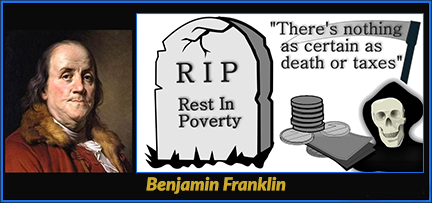Taxes and Your Estate

When someone passes on and there is no spouse to which the estate will directly go to, there will be taxes to pay. There will be taxes on capital gains on any investments or property that is sold for more than what the original owner paid for it. To check out a full explanation and definition, go to Capital Gains — 2020.
At the writing of this article, Canada has no specific inheritance tax, but in the US, there is a sliding scale. However, in Canada, each province has estate administration fees, with the highest fees in Ontario and the lowest in Quebec. You will need to look at the rules for your particular province. In the US, only 17 states have varying taxes. Connecticut, Hawaii, Illinois, Maine, Massachusetts, Minnesota, New York, Oregon, Rhode Island, Vermont, Washington Iowa, Kentucky, Nebraska, New Jersey, Pennsylvania, Rhode Island, and Washington DC have some form of taxes.
Taxes are considerably more complicated when you die. At the time of your death, all that you own is deemed sold. This adds to your normal yearly taxable income. All your assets are considered sold, creating a capital gains tax, which, in Canada, means 50% of the capital gain is taxable or in the case of RRSPs and RRIFs are fully taxed. For this reason, it is wise for the executor to hire an accountant to figure out and file the final tax return for the deceased, as this would be a good investment. If you want to know what goes into it, you can look up Preparing Returns for Deceased Persons 2020.
As mentioned in previous posts, you should always name a beneficiary or beneficiaries. By doing this, the estate may pass through probate, avoid some fees, and may even go directly to the beneficiary. This is particularly true for insurance policies, any registered retirement plans, tax-free savings accounts, and annuities.
Probate Fees
Probate is where the courts determine that your will is indeed legal, binding, and your wishes. Probate fees vary by province and state. In Canada you can go to Taxtips to find out what the probate fees are in your province.
Property
Property seems to be the most problematic. If you are leaving the family home, secondary home, or cottage, chances are you will have to pay tax on the capital gains. As mentions earlier, the simple form of determining capital gains is the amount the property is deemed to be valued at presently subtracted by the original purchase price; you pay tax on the difference. Right now the capital gains tax in Canada sits at 50% on half of the gain. In the US, it is slightly different. The home or cottage would go to your beneficiary(s) tax free, but when they sell it, they will be taxed on any amount of the value up and above the value of what the home was when you inherited it.
The kicker is that if there are any property taxes owing, debt obligations like a mortgage, and ongoing maintenance and upkeep, the beneficiary(s) are responsible for these.
What can you do to minimize this:
- Add the beneficiary’s(s) name(s) to the cottage now and take a smaller hit now.
- Take out an insurance policy on your life that will cover the capital gains tax in the future.
- Sell the cottage to the kids now and take a promissory note or I.O.U. and pay the capital gains over 5 years. This is called a “capital gains reserve.”
- You could explore a trust, talk to your lawyer and accountant about the consequences.
Ways to minimize tax:
- While you are alive give gifts to your family and the organizations you wish to support.
- If it makes sense, have all that you own registered in both you and your partner’s name. If you are on your own and have only one child, have them as a joint owner. In the case of your home, make sure that the title is registered in a way that includes right of survivorship so that your partner gets full title and the home doesn’t have to go through probate.
- If you own a company, you can establish a separate will for that company.
- You can also set up a trust. These are dealt separately from your estate.
- In some cases, having a permanent life insurance policy can help reduce taxable income and provide you with a tax-efficient payout at death.
Before you use any of these strategies, you should discuss it with your accountant to determine their immediate and long-term effect.
As the old saying goes “the devil is in the details.” Yes, going through this planning process may take a little doing, but it will pay dividends in the long run. But you can’t leave it there. You must review it every few years, as your situation is always in flux.
Good luck and hopefully your family will not have to use these documents for a long time.
